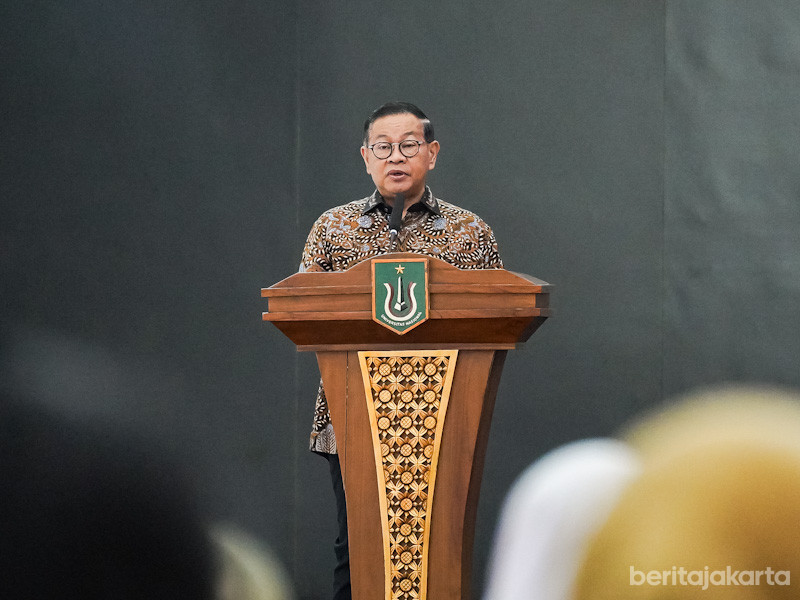

Tuesday, August 26th 2025 Reporter: Dessy Suciati Translator: Maria Inggita 435

(Foto: Reza Pratama Putra)
Jakarta Governor Pramono Anung has invited experts and academics to collaborate in conserving biodiversity in the capital.
" I invite all parties to work together in supporting biodiversity management in Jakarta,"
He made the call during the opening of the 18th PBI Congress and International Conference on Biodiversity and Future Biology (ICo-BioFuB) 2025, held at National University on Tuesday (8/26). The event, themed "Innovations for Conservation and Sustainability," brought together experts and students from various countries.
"Biodiversity is not just an environmental issue, but also closely related to health, the economy, and the future of humanity. Therefore, I invite all parties to work together in supporting biodiversity management in Jakarta," said Pramono.
According to him, this conference's theme is relevant to address global challenges such as biodiversity conservation, climate change, and sustainable development.
“I hope this conference will generate inspiration, innovation, ideas, and solutions to respond to these challenges and realize sustainability for future generations,” he expressed.
Pramono hopes that experts can contribute in Jakarta in preserving and protecting biodiversity. He also welcomed the idea of Jakarta becoming a biodiversity laboratory in the future.
“We support that, including if there is research that can be collaborated between the Jakarta Government and universities, we will support it,” he asserted.
He noted that Indonesia is known as a megabiodiversity country with a variety of ecosystems, ranging from tropical forests and oceans to urban areas that play an important role in maintaining global ecological balance.
Therefore, the Indonesian Government reaffirms its commitment to preserving biodiversity through the Global Biodiversity Framework and the Indonesian Biodiversity Strategy and Action Plan (IBSAP) 2025–2045.
"This effort aligns with both global and national goals, encouraging collaboration to achieve inclusive, competitive, and sustainable development," he added.
As a megacity, Jakarta has a diverse range of ecosystems, spanning marine, terrestrial, and freshwater areas. He highlighted the marine ecosystem in the Thousand Islands, rich in coral reefs and mangroves, which serve as vital pillars for coastal ecological balance.
As for the terrestrial ecosystem, the Jakarta Provincial Government strives to preserve urban forests, city parks, green open spaces, gardens, and yards to support the survival of flora and fauna. The same goes for freshwater ecosystems, including rivers, lakes, and reservoirs.
"This city manages 49 urban forests, 949 green lanes, 7 plant nurseries, 1,459 parks, and 82 public cemeteries, all functioning as green open spaces," said Pramono.
Despite ongoing urbanization, Jakarta Governor Pramono Anung stated that the capital remains a habitat for more than 100 bird species, rare wildlife, and endemic plants, all of which play a vital role in biodiversity conservation.
"We have several iconic species such as the Brahminy Kite, which is the city's mascot, Salak Condet—Jakarta's signature fruit—along with the Sunda pangolin, hawksbill turtle, and long-tailed macaque," he said.
However, Pramono acknowledged that Jakarta still faces numerous challenges in conserving biodiversity, including pollution, urban expansion, illegal wildlife trade, invasive species, and climate change impacts such as tidal flooding and extreme weather.
To address these challenges, the Jakarta Provincial Government has established the Biodiversity Management Master Plan 2025–2029, with a vision of living in harmony with nature toward a global, competitive, and sustainable city.
The policy focuses on in-situ and ex-situ conservation; green open space connectivity; biodiversity villages rooted in local wisdom; sustainable utilization of biodiversity as a source of food, medicine, cultural heritage, and ecotourism; innovation and research; and multi-stakeholder collaboration in safeguarding and managing biodiversity.
To support Jakarta's transformation into a global city, Pramono emphasized the need for strong commitment and support for biodiversity conservation. This effort, he said, is crucial to maintain ecological balance, strengthen climate resilience, improve public health, and ensure a high quality of life for city residents.
Therefore, Jakarta remains committed to balancing development with environmental preservation, while also contributing to national and global biodiversity and sustainability goals.
Meanwhile, National University Management Advisor Yuddy Chrisnandi highlighted the vital role of scientists and biology practitioners in addressing global challenges such as climate change, environmental degradation, and food crisis.
He noted that the conference serves as a crucial platform for sharing knowledge, ideas, and innovations in pursuit of conservation and sustainability.
"Hopefully, this conference will generate concrete suggestions and recommendations for conserving nature and advancing science for a sustainable future," said Yuddy.
He added that today's biodiversity and future biology issues present both challenges and opportunities. Biodiversity conservation must become a priority through habitat protection, sustainable resource management, law enforcement, and public awareness.
"Going forward, biology holds tremendous potential to shape a better future, although it also brings ethical challenges we must address wisely," he concluded.